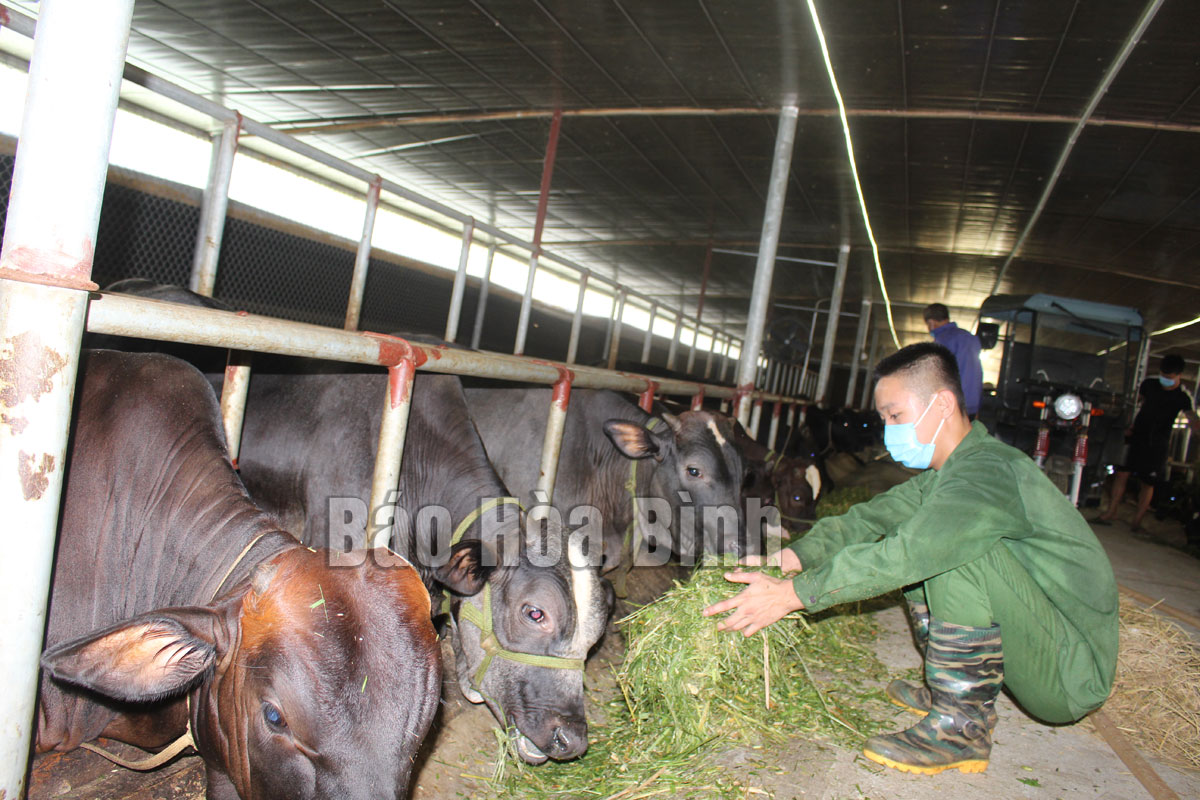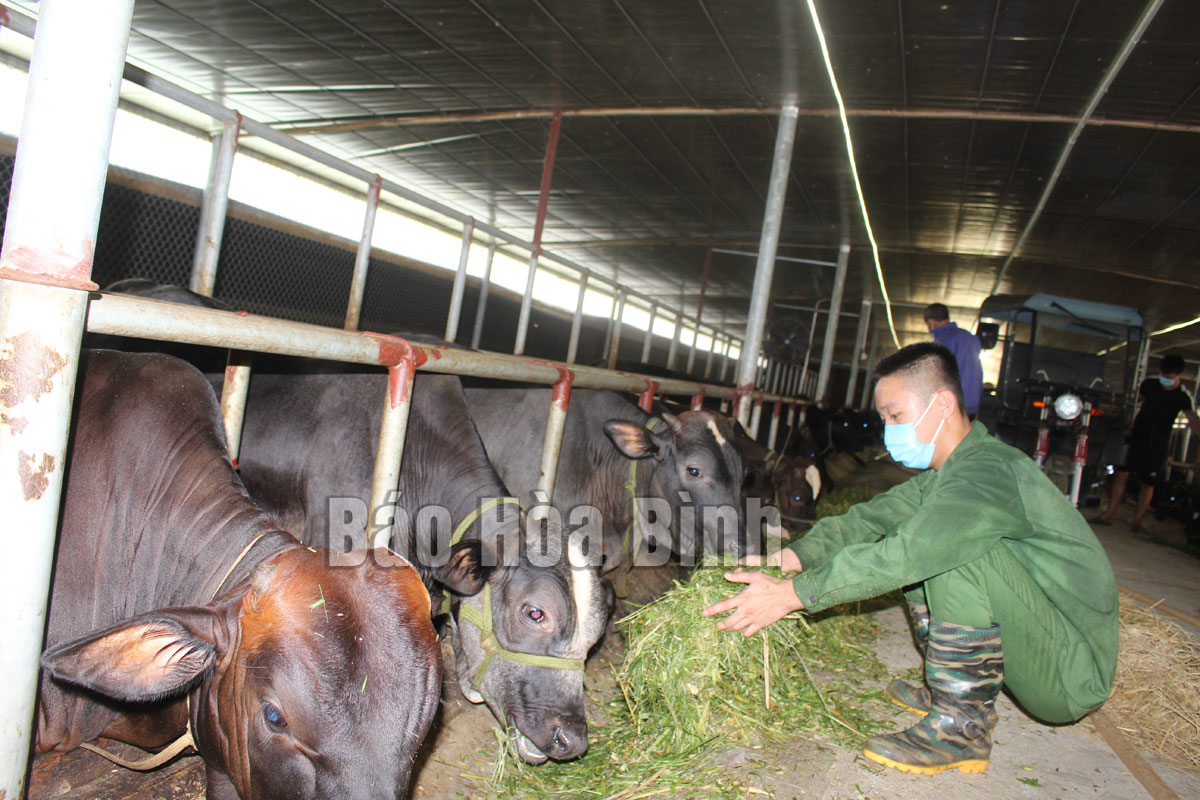
(HBO) – Given the complicated development of COVID-19 in Luong Son district, local cooperatives have adjusted their production and business plans and diversified their approaches to the market. As a result, they have sustained production and boosted their capacity to adapt to the situation.
 Workers at the Cao Son Xanh cooperative in Luong Son’s Cao Son commune
seriously follow the Ministry of Health’s 5K message for COVID-19 prevention
and control.
Workers at the Cao Son Xanh cooperative in Luong Son’s Cao Son commune
seriously follow the Ministry of Health’s 5K message for COVID-19 prevention
and control.
From 6pm on July 27, Luong Son imposed social distancing measures under the
Prime Minister’s Directive 16 on COVID-19 prevention and control. To seriously
enforce the measures while mitigating their negative impact on business and
production, local cooperatives have come up with suitable solutions.
At the beginning of the year, the Cao Son Xanh cooperative has got safe
production plans ready. All of its 6ha of land for raising 100 cows are guarded
strictly. Ha Ngoc Hoa said to ensure COVID-19 prevention, the farm is shut to
outsiders. Three regular workers are also not allowed to go out of the
cooperative area and are provided with accommodation and daily necessities,
while animal feed suppliers have to present negative COVID-19 quick test to
enter the place.
According to statistics, Luong Son has 57 cooperatives with over 600 members
and nearly 500 workers, whose monthly income is between 3 and 3.5 million VND.
They help create jobs, ease poverty, boost economic and labour restructuring,
and exploit the locality’s strengths and potential. In the face of
unpredictable developments of the pandemic, the collective economic sector
plays an important role in the district’s realisation of its dual goals in
socio-economic development. Notably, agricultural cooperatives are now an
important in-place source of food supply to ensure food security during the
social distancing period. The new situation, meanwhile, is a chance for local
cooperatives to build their business strategies and change their marketing
methods by applying digital technologies.
Thu Thuy
http://www.baohoabinh.com.vn/12/155792/Huyen-Luong-son-Hop-tac-xa-linh-hoat-thich-ung-tr111ng-tinh-hinh-moi.htm
According to data from the Hoa Binh Provincial Party Committee, the industrial production index for the first six months of 2025 is estimated to have increased by 20% compared to the same period last year. This marks the highest year-on-year growth rate for this period since 2020.
In the first six months of 2025, Hoa Binh province’s export turnover was estimated at 1.145 billion USD, marking an 18.11% increase compared to the same period in 2024. Import turnover was estimated at $ 804 million, a 17.15% increase, which helped the province maintain a positive trade balance.
The lives of the ethnic minority farmers in Tan Lac district have gradually improved thanks to the new directions in agricultural production. This is a testament to the collective strength fostered through the professional associations and groups implemented by various levels of the district’s Farmers’ Union.
With the motto the "product quality comes first,” after nearly one year of establishment and operation, Muong village’s Clean Food Agricultural and Commercial Cooperative, located in Cau Hamlet, Hung Son Commune (Kim Boi district), has launched reputable, high-quality agricultural products to the market that are well-received by consumers. The products such as Muong village’s pork sausage, salt-cured chicken, and salt-cured pork hocks have gradually carved out a place in the market and they are on the path to obtaining the OCOP certification.
In the past, the phrase "bumper harvest, rock-bottom prices" was a familiar refrain for Vietnamese farmers engaged in fragmented, small-scale agriculture. But today, a new spirit is emerging across rural areas of Hoa Binh province - one of collaboration, organisation, and collective economic models that provide a stable foundation for production.
Maintaining growing area codes and packing facility codes in accordance with regulations is a mandatory requirement for agricultural products to be eligible for export. Recently, the Department of Agriculture and Environment of Hoa Binh province has intensified technical supervision of designated farming areas and packing facilities to safeguard the "green passport" that enables its products to access international markets.



 Workers at the Cao Son Xanh cooperative in Luong Son’s Cao Son commune
seriously follow the Ministry of Health’s 5K message for COVID-19 prevention
and control.
Workers at the Cao Son Xanh cooperative in Luong Son’s Cao Son commune
seriously follow the Ministry of Health’s 5K message for COVID-19 prevention
and control.